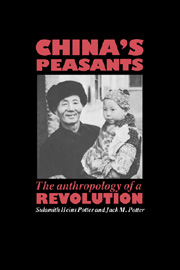Book contents
- Frontmatter
- Contents
- List of illustrations
- List of tables
- Preface
- Notes on the text
- Map 1 China
- 1 The old “feudal” order: Zengbu before Liberation
- 2 Establishing the new order
- 3 The ordeal of collectivization
- 4 The Cultural Revolution
- 5 Maoist society: the production team
- 6 Maoist society: the brigade
- 7 Maoist society: the commune
- 8 Impatient aspirations: transition to the post-Mao period
- 9 The cultural construction of emotion in rural Chinese social life
- 10 Marriage, household, and family form
- 11 Chinese birth planning: a cultural account
- 12 Lineage and collective: structure and praxis
- 13 Party organization
- 14 The party ethic: a devotion born of distress and enthusiasm
- 15 A caste-like system of social stratification: the position of peasants in modern China's social order
- 16 The Chinese peasants and the world capitalist system
- 17 The crystallization of post-Mao society: Zengbu in 1985
- References
- Index
11 - Chinese birth planning: a cultural account
Published online by Cambridge University Press: 02 December 2009
- Frontmatter
- Contents
- List of illustrations
- List of tables
- Preface
- Notes on the text
- Map 1 China
- 1 The old “feudal” order: Zengbu before Liberation
- 2 Establishing the new order
- 3 The ordeal of collectivization
- 4 The Cultural Revolution
- 5 Maoist society: the production team
- 6 Maoist society: the brigade
- 7 Maoist society: the commune
- 8 Impatient aspirations: transition to the post-Mao period
- 9 The cultural construction of emotion in rural Chinese social life
- 10 Marriage, household, and family form
- 11 Chinese birth planning: a cultural account
- 12 Lineage and collective: structure and praxis
- 13 Party organization
- 14 The party ethic: a devotion born of distress and enthusiasm
- 15 A caste-like system of social stratification: the position of peasants in modern China's social order
- 16 The Chinese peasants and the world capitalist system
- 17 The crystallization of post-Mao society: Zengbu in 1985
- References
- Index
Summary
Birth is universal. However, the meaning of giving birth is not universal, but culturally specific. Preventing the process of giving birth is also inevitably replete with cultural significance. To these social actions, the villagers bring an immensely complicated set of assumptions. They are unexamined assumptions, existing as a basis for thought rather than as a conscious plan of action.
In order to understand the cultural significance of birth planning, it is necessary to discuss these culturally specific assumptions. Children are understood as the solution to adult problems that the villagers take very seriously indeed. They can share the work, with all that this implies; if male, they can dignify existence by providing a sense that the family line is being carried on; most importantly, they provide a solution to the burning psychological question, “Who will ever take care of me?” Being a legitimate recipient of care is deferred until old age, in this cultural setting: no care before that time has the legitimacy of the care provided by the young for the old. The dependency needs of the young must wait, since elders have prior claims. By old age, the wish to be taken care of is an unfulfilled desire of long standing. Yet a lifetime of feeling the obligation to care for others, and deferring the wish to be cared for one's self, has provided an experience which makes people doubt that they will ever be cared for, or if it is possible for them to receive enough care.
- Type
- Chapter
- Information
- China's PeasantsThe Anthropology of a Revolution, pp. 225 - 250Publisher: Cambridge University PressPrint publication year: 1990
- 1
- Cited by



